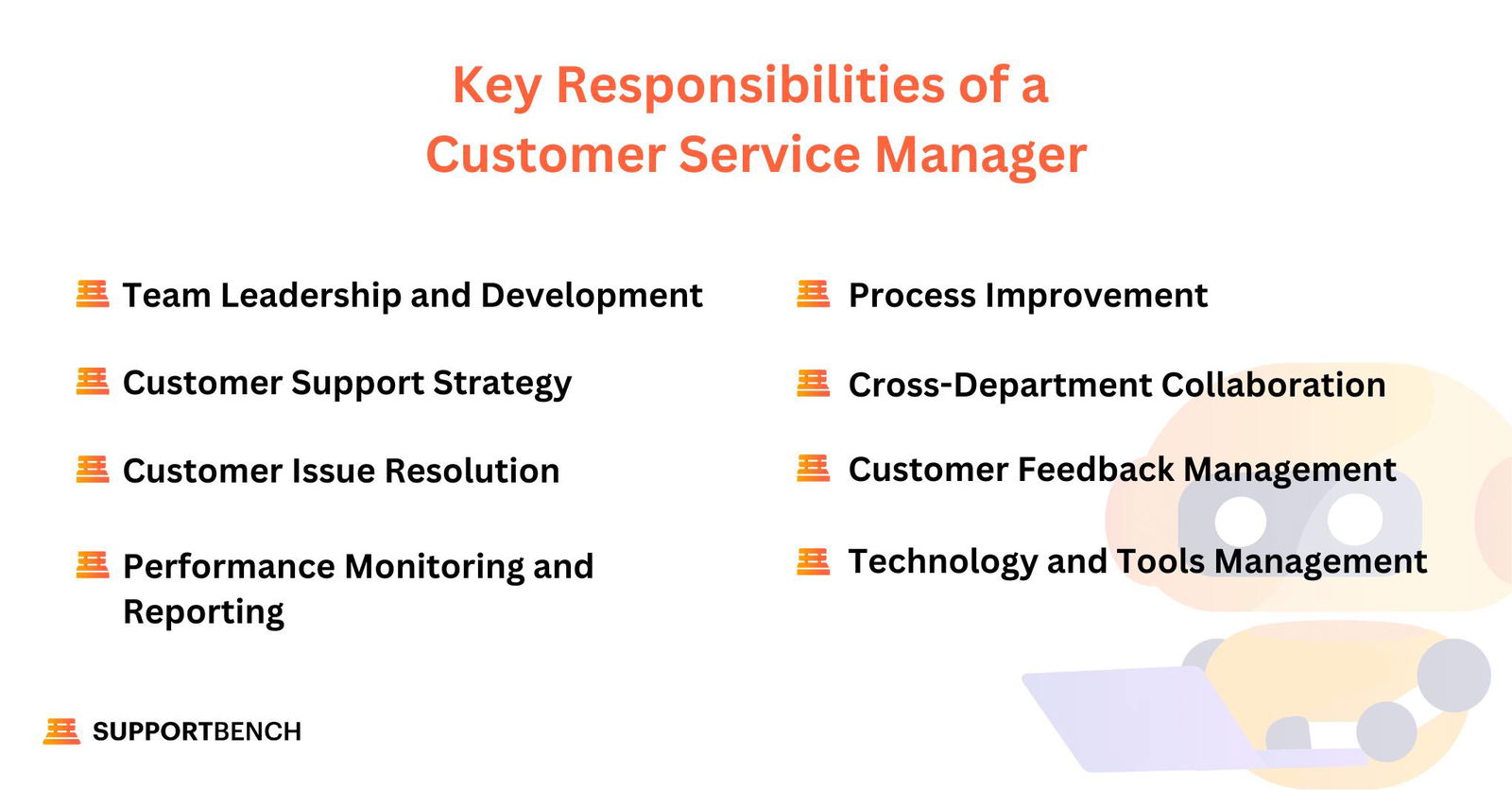Many customer service representatives eventually transition into management roles. While there are several career paths, including sales and customer success, becoming a customer service manager is one of the most common and rewarding.
After years of helping customers solve problems, you’re ready to take on a leadership role. However, managing a team of agents and ensuring consistently excellent customer service is no easy task.
A successful customer service manager needs a blend of communication, leadership, and customer service skills. The role is challenging but highly rewarding for the right individual.
In this blog, we’ll outline the key responsibilities of a customer service manager and how they contribute to business growth.
Key Responsibilities of a Customer Service Manager
A Customer Service Manager plays a pivotal role in enhancing the customer service operations of a business. Their responsibilities are vast, encompassing team leadership, strategy development, and continuous improvement. Below are the key responsibilities that define this role:

Team Leadership and Development
Customer Service Managers lead and manage a team of customer service representatives. They hire, train, and develop staff to ensure they possess the necessary skills to deliver exceptional service. Regular performance evaluations, feedback, and professional development programs are also part of their responsibilities.
Customer Support Strategy
A key responsibility of the manager is developing and implementing customer support strategies. This involves analyzing customer feedback, industry trends, and company goals to create effective strategies that enhance service delivery and establish clear service standards.
Performance Monitoring and Reporting
Customer Service Managers track key performance indicators (KPIs) like response times, customer satisfaction, and resolution rates. Regular reporting helps identify areas for improvement and measure the success of strategies put in place.
Customer Issue Resolution
Managers handle escalated complaints and complex issues that first-level agents can’t resolve. Using their expertise, they address customer problems efficiently while balancing customer satisfaction with company policies.
Process Improvement
Managers continuously review and refine customer service processes to boost efficiency and effectiveness. This may include adopting new technologies, updating procedures, and implementing best practices to enhance the customer experience.
Cross-Department Collaboration
Customer service often involves working closely with other departments such as sales, marketing, and product development. Customer Service Managers collaborate with these teams to ensure a unified approach to customer care, providing insights and feedback to help improve company offerings.
Customer Feedback Management
Collecting and analyzing customer feedback is a vital task. Managers design and implement feedback mechanisms like surveys and focus groups to identify trends and recurring issues, ensuring service improvements are data-driven.
Technology and Tools Management
Managers oversee the tools and technologies used by the customer service team. This includes selecting, installing, and upgrading customer service software to ensure the team has the necessary tools for efficient and seamless support.
What is the main responsibility of a customer service manager?
The primary role of a customer service manager is to ensure customer satisfaction by overseeing every point of contact throughout the customer journey, from the initial inquiry to issue resolution. A manager’s ability to manage this process effectively impacts the company’s reputation and profitability.
The core of customer satisfaction lies in relationship-building. Customer service managers must listen to their customers, address complaints promptly, and exceed expectations. By fostering strong relationships, managers turn satisfied customers into loyal brand ambassadors, driving long-term success.

Skills and Qualities of an Effective Customer Service Manager
To succeed as a customer service manager, a blend of hard and soft skills is essential. Key qualities include:
- Strong Leadership Skills: The ability to motivate, inspire, and guide a team toward common goals.
- Excellent Communication: Clear communication with customers, team members, and other departments is crucial.
- Problem-Solving Skills: Quickly identifying and resolving issues to ensure customer satisfaction.
- Empathy: Understanding and addressing the emotional needs of customers.
- Adaptability: Staying flexible in an ever-changing customer service environment, from new technologies to shifting market trends.
- Analytical Skills: Using data to spot trends and continuously improve service.
- Organizational Skills: Managing multiple tasks and prioritizing effectively.
- Technical Skills: Proficiency with customer service software and tools.
- Customer-Focused Mindset: Always striving to enhance the customer experience and build loyalty.
Developing these skills enables customer service managers to become effective leaders and drive positive changes within their teams and organizations.
Challenges Faced by Customer Service Managers
While customer service managers play a critical role in a company’s success, they encounter several challenges:
- Managing Remote Teams: With the rise of remote work, customer service managers must effectively oversee and motivate teams across different locations.
- Handling Difficult Customers: Dealing with frustrated or angry customers requires patience, empathy, and excellent communication.
- Meeting Increasing Customer Expectations: Today’s customers have higher expectations, requiring constant innovation and service improvements to keep up.
- Managing High Call Volumes: During peak periods, high call volumes can lead to longer wait times and frustrated customers.
- Staying Updated with Technology: Managers must stay on top of the latest customer service tools and trends to equip their teams for modern customer interactions.
These challenges demand resilience and continuous learning to maintain high-quality service and meet customer demands effectively.

Conclusion: The Impact of a Skilled Customer Service Manager
A skilled Customer Service Manager is vital to any organization’s success. They ensure efficient team operations, resolve customer issues effectively, and continuously improve the customer experience. By excelling in leadership, communication, problem-solving, and strategic planning, Customer Service Managers drive customer satisfaction and loyalty, which directly impacts the company’s success.
At Supportbench, we recognize the critical role Customer Service Managers play in achieving exceptional service. Our AI-powered solutions, including ticket management, workflow automation, and analytics, help empower customer service teams and streamline support processes.
If you’re ready to enhance your customer service operations, explore how Supportbench can support you. Schedule a demo today to see how we can transform your customer support experience. Visit Supportbench and take the first step toward delivering superior customer service.












